Higher Education Study Skills Report: Literature Review & CSR
VerifiedAdded on 2020/11/23
|9
|2597
|80
Report
AI Summary
This report delves into the critical study skills required for success in higher education, emphasizing the importance of developing effective learning strategies. It begins by defining a literature review, outlining its objectives, types, and significance in academic research, including how it helps identify knowledge gaps and justify methodologies. The report then transitions into a literature review on corporate social responsibility (CSR), examining its various definitions and implications. It explores how CSR enhances a company's public image, improves employee engagement, fosters customer loyalty, and contributes to sustainable development. The report also acknowledges potential negative aspects of CSR, such as high costs, and concludes by highlighting the positive outcomes of CSR for business success and brand image.
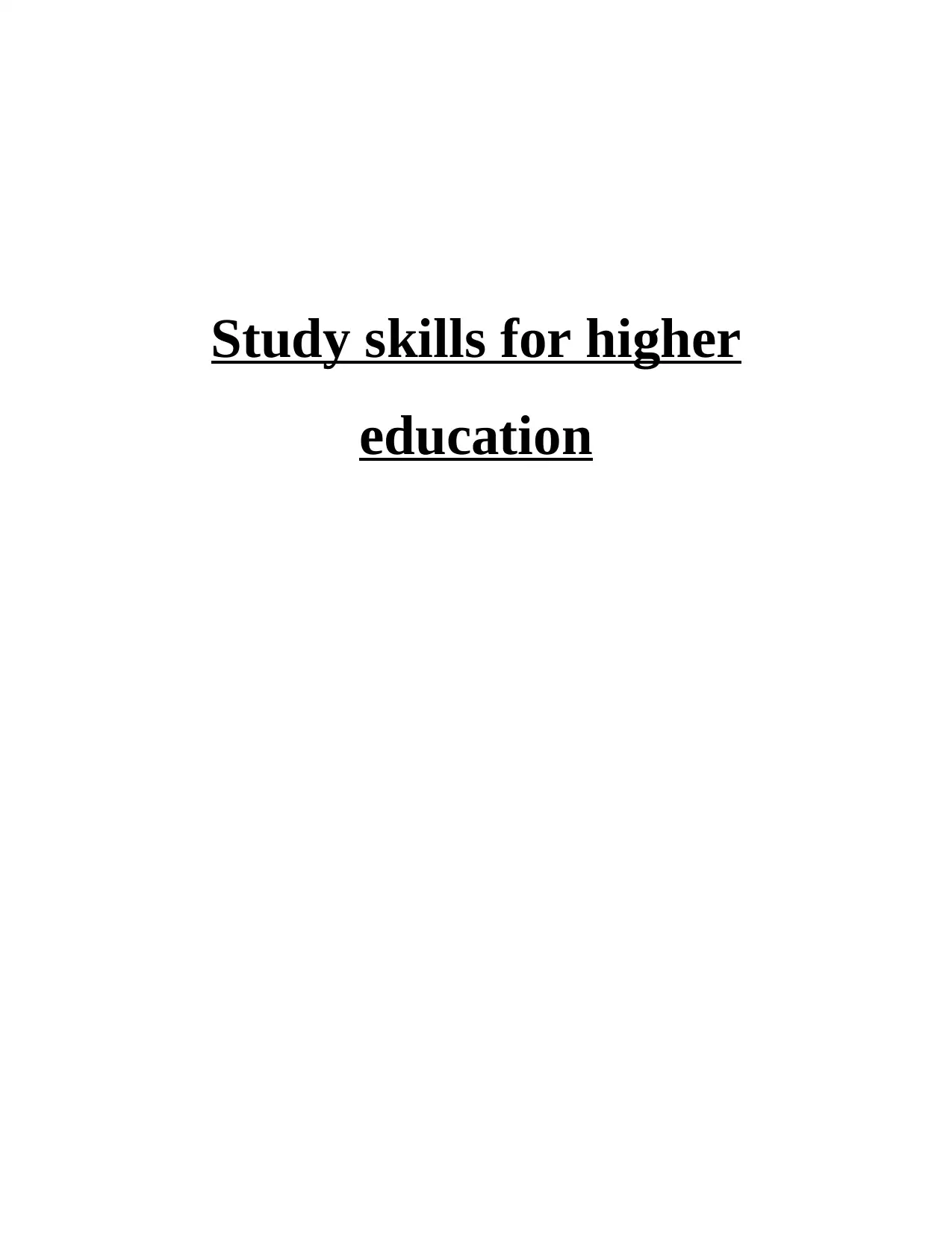
Study skills for higher
education
education
Paraphrase This Document
Need a fresh take? Get an instant paraphrase of this document with our AI Paraphraser
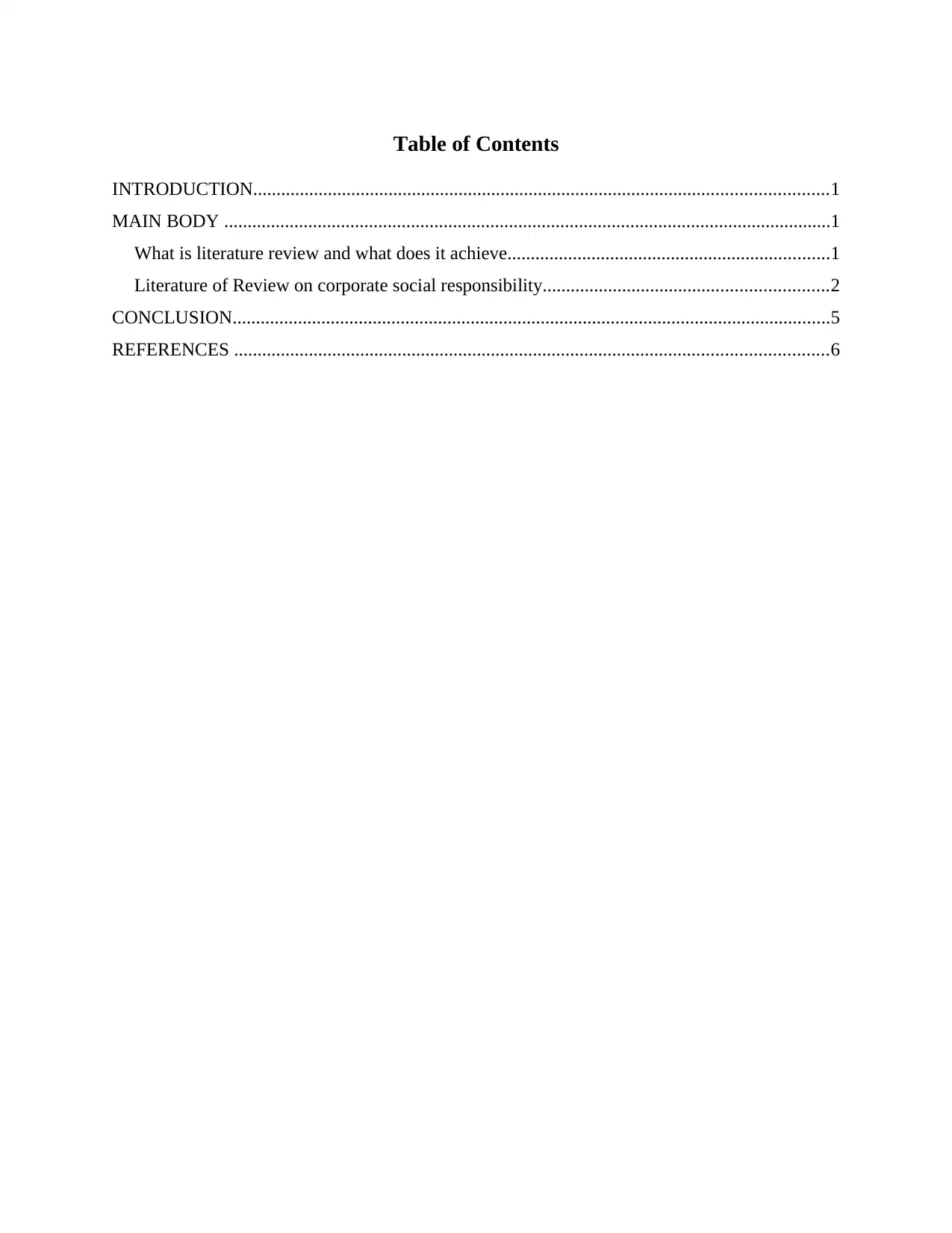
Table of Contents
INTRODUCTION...........................................................................................................................1
MAIN BODY ..................................................................................................................................1
What is literature review and what does it achieve.....................................................................1
Literature of Review on corporate social responsibility.............................................................2
CONCLUSION................................................................................................................................5
REFERENCES ...............................................................................................................................6
INTRODUCTION...........................................................................................................................1
MAIN BODY ..................................................................................................................................1
What is literature review and what does it achieve.....................................................................1
Literature of Review on corporate social responsibility.............................................................2
CONCLUSION................................................................................................................................5
REFERENCES ...............................................................................................................................6
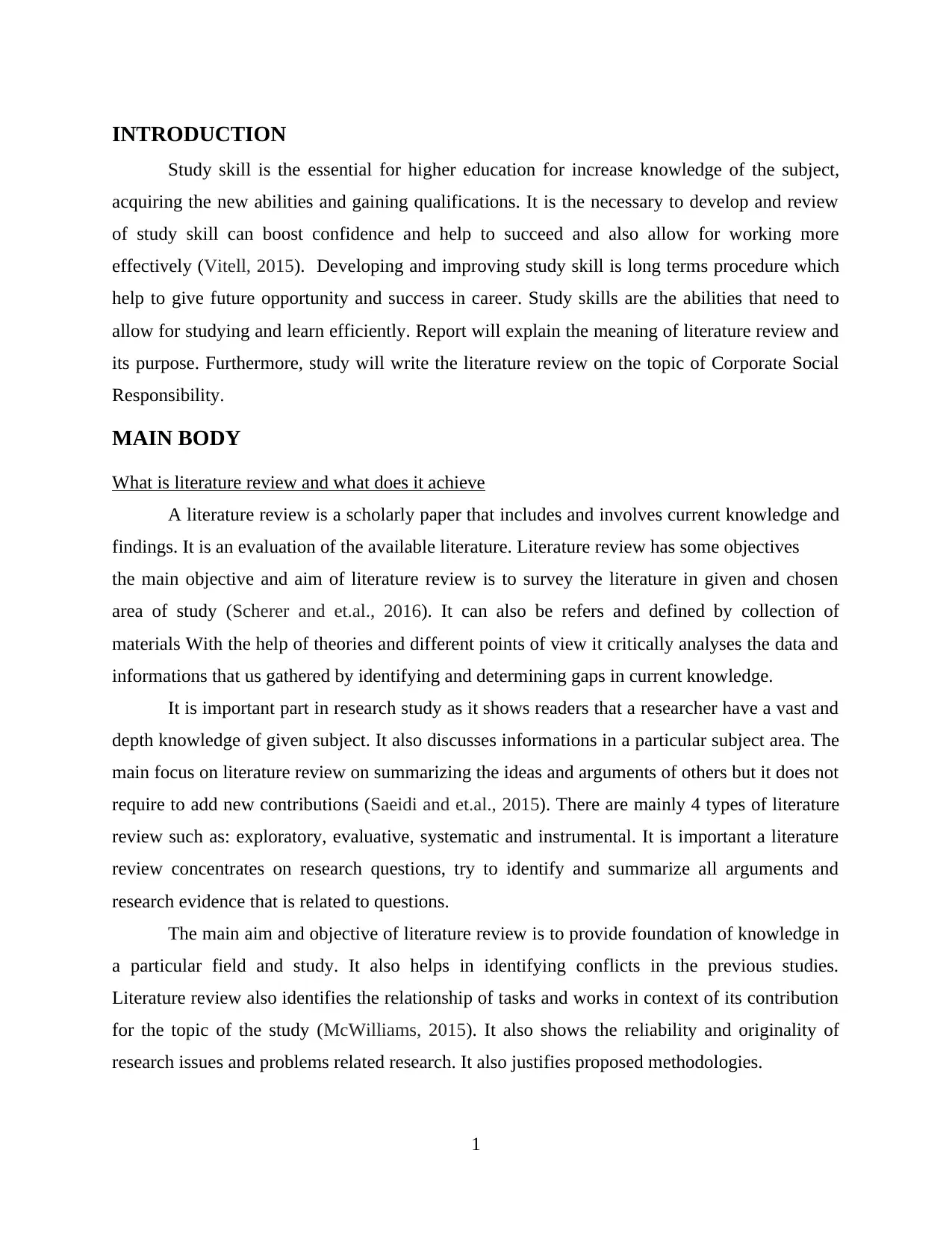
INTRODUCTION
Study skill is the essential for higher education for increase knowledge of the subject,
acquiring the new abilities and gaining qualifications. It is the necessary to develop and review
of study skill can boost confidence and help to succeed and also allow for working more
effectively (Vitell, 2015). Developing and improving study skill is long terms procedure which
help to give future opportunity and success in career. Study skills are the abilities that need to
allow for studying and learn efficiently. Report will explain the meaning of literature review and
its purpose. Furthermore, study will write the literature review on the topic of Corporate Social
Responsibility.
MAIN BODY
What is literature review and what does it achieve
A literature review is a scholarly paper that includes and involves current knowledge and
findings. It is an evaluation of the available literature. Literature review has some objectives
the main objective and aim of literature review is to survey the literature in given and chosen
area of study (Scherer and et.al., 2016). It can also be refers and defined by collection of
materials With the help of theories and different points of view it critically analyses the data and
informations that us gathered by identifying and determining gaps in current knowledge.
It is important part in research study as it shows readers that a researcher have a vast and
depth knowledge of given subject. It also discusses informations in a particular subject area. The
main focus on literature review on summarizing the ideas and arguments of others but it does not
require to add new contributions (Saeidi and et.al., 2015). There are mainly 4 types of literature
review such as: exploratory, evaluative, systematic and instrumental. It is important a literature
review concentrates on research questions, try to identify and summarize all arguments and
research evidence that is related to questions.
The main aim and objective of literature review is to provide foundation of knowledge in
a particular field and study. It also helps in identifying conflicts in the previous studies.
Literature review also identifies the relationship of tasks and works in context of its contribution
for the topic of the study (McWilliams, 2015). It also shows the reliability and originality of
research issues and problems related research. It also justifies proposed methodologies.
1
Study skill is the essential for higher education for increase knowledge of the subject,
acquiring the new abilities and gaining qualifications. It is the necessary to develop and review
of study skill can boost confidence and help to succeed and also allow for working more
effectively (Vitell, 2015). Developing and improving study skill is long terms procedure which
help to give future opportunity and success in career. Study skills are the abilities that need to
allow for studying and learn efficiently. Report will explain the meaning of literature review and
its purpose. Furthermore, study will write the literature review on the topic of Corporate Social
Responsibility.
MAIN BODY
What is literature review and what does it achieve
A literature review is a scholarly paper that includes and involves current knowledge and
findings. It is an evaluation of the available literature. Literature review has some objectives
the main objective and aim of literature review is to survey the literature in given and chosen
area of study (Scherer and et.al., 2016). It can also be refers and defined by collection of
materials With the help of theories and different points of view it critically analyses the data and
informations that us gathered by identifying and determining gaps in current knowledge.
It is important part in research study as it shows readers that a researcher have a vast and
depth knowledge of given subject. It also discusses informations in a particular subject area. The
main focus on literature review on summarizing the ideas and arguments of others but it does not
require to add new contributions (Saeidi and et.al., 2015). There are mainly 4 types of literature
review such as: exploratory, evaluative, systematic and instrumental. It is important a literature
review concentrates on research questions, try to identify and summarize all arguments and
research evidence that is related to questions.
The main aim and objective of literature review is to provide foundation of knowledge in
a particular field and study. It also helps in identifying conflicts in the previous studies.
Literature review also identifies the relationship of tasks and works in context of its contribution
for the topic of the study (McWilliams, 2015). It also shows the reliability and originality of
research issues and problems related research. It also justifies proposed methodologies.
1
⊘ This is a preview!⊘
Do you want full access?
Subscribe today to unlock all pages.

Trusted by 1+ million students worldwide
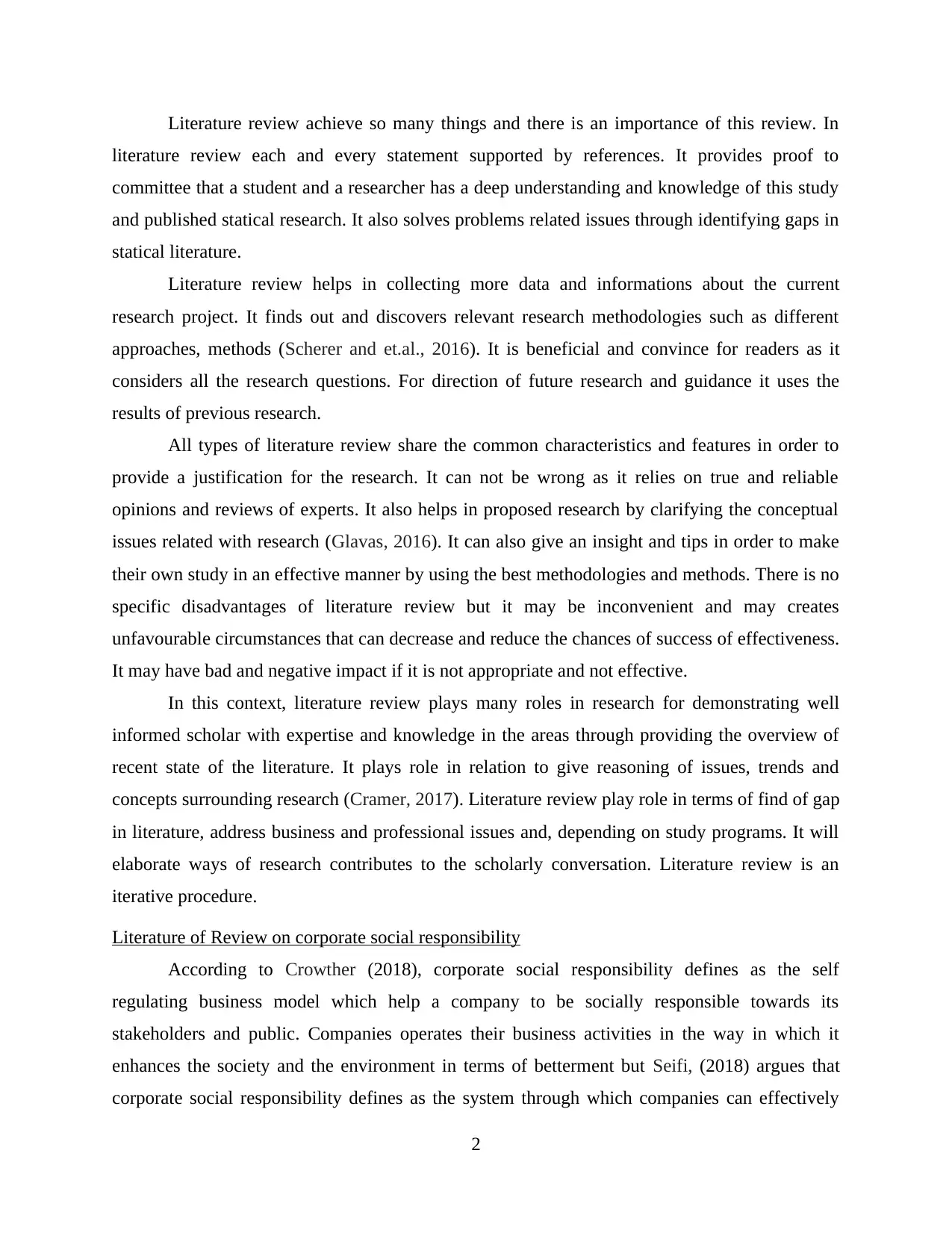
Literature review achieve so many things and there is an importance of this review. In
literature review each and every statement supported by references. It provides proof to
committee that a student and a researcher has a deep understanding and knowledge of this study
and published statical research. It also solves problems related issues through identifying gaps in
statical literature.
Literature review helps in collecting more data and informations about the current
research project. It finds out and discovers relevant research methodologies such as different
approaches, methods (Scherer and et.al., 2016). It is beneficial and convince for readers as it
considers all the research questions. For direction of future research and guidance it uses the
results of previous research.
All types of literature review share the common characteristics and features in order to
provide a justification for the research. It can not be wrong as it relies on true and reliable
opinions and reviews of experts. It also helps in proposed research by clarifying the conceptual
issues related with research (Glavas, 2016). It can also give an insight and tips in order to make
their own study in an effective manner by using the best methodologies and methods. There is no
specific disadvantages of literature review but it may be inconvenient and may creates
unfavourable circumstances that can decrease and reduce the chances of success of effectiveness.
It may have bad and negative impact if it is not appropriate and not effective.
In this context, literature review plays many roles in research for demonstrating well
informed scholar with expertise and knowledge in the areas through providing the overview of
recent state of the literature. It plays role in relation to give reasoning of issues, trends and
concepts surrounding research (Cramer, 2017). Literature review play role in terms of find of gap
in literature, address business and professional issues and, depending on study programs. It will
elaborate ways of research contributes to the scholarly conversation. Literature review is an
iterative procedure.
Literature of Review on corporate social responsibility
According to Crowther (2018), corporate social responsibility defines as the self
regulating business model which help a company to be socially responsible towards its
stakeholders and public. Companies operates their business activities in the way in which it
enhances the society and the environment in terms of betterment but Seifi, (2018) argues that
corporate social responsibility defines as the system through which companies can effectively
2
literature review each and every statement supported by references. It provides proof to
committee that a student and a researcher has a deep understanding and knowledge of this study
and published statical research. It also solves problems related issues through identifying gaps in
statical literature.
Literature review helps in collecting more data and informations about the current
research project. It finds out and discovers relevant research methodologies such as different
approaches, methods (Scherer and et.al., 2016). It is beneficial and convince for readers as it
considers all the research questions. For direction of future research and guidance it uses the
results of previous research.
All types of literature review share the common characteristics and features in order to
provide a justification for the research. It can not be wrong as it relies on true and reliable
opinions and reviews of experts. It also helps in proposed research by clarifying the conceptual
issues related with research (Glavas, 2016). It can also give an insight and tips in order to make
their own study in an effective manner by using the best methodologies and methods. There is no
specific disadvantages of literature review but it may be inconvenient and may creates
unfavourable circumstances that can decrease and reduce the chances of success of effectiveness.
It may have bad and negative impact if it is not appropriate and not effective.
In this context, literature review plays many roles in research for demonstrating well
informed scholar with expertise and knowledge in the areas through providing the overview of
recent state of the literature. It plays role in relation to give reasoning of issues, trends and
concepts surrounding research (Cramer, 2017). Literature review play role in terms of find of gap
in literature, address business and professional issues and, depending on study programs. It will
elaborate ways of research contributes to the scholarly conversation. Literature review is an
iterative procedure.
Literature of Review on corporate social responsibility
According to Crowther (2018), corporate social responsibility defines as the self
regulating business model which help a company to be socially responsible towards its
stakeholders and public. Companies operates their business activities in the way in which it
enhances the society and the environment in terms of betterment but Seifi, (2018) argues that
corporate social responsibility defines as the system through which companies can effectively
2
Paraphrase This Document
Need a fresh take? Get an instant paraphrase of this document with our AI Paraphraser
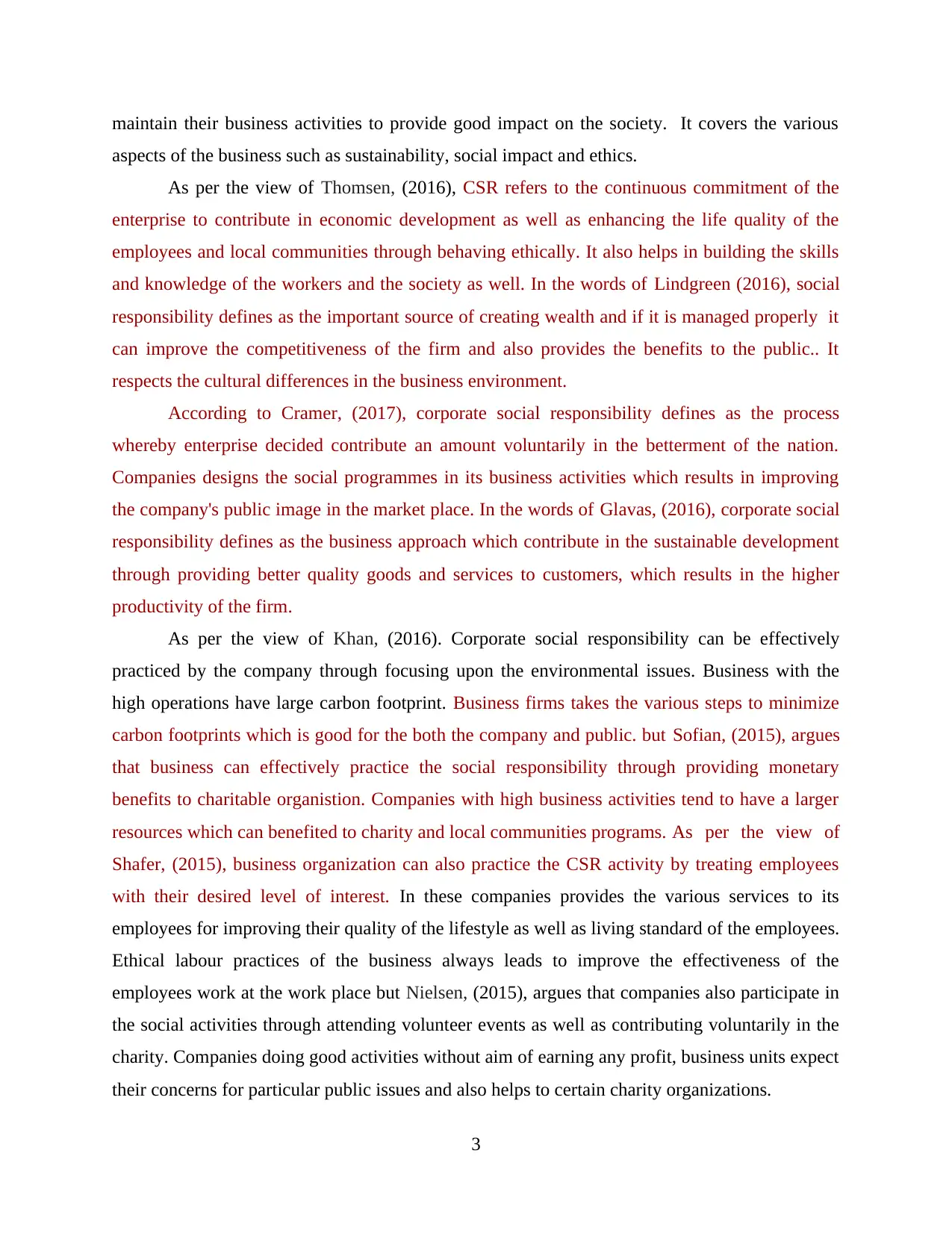
maintain their business activities to provide good impact on the society. It covers the various
aspects of the business such as sustainability, social impact and ethics.
As per the view of Thomsen, (2016), CSR refers to the continuous commitment of the
enterprise to contribute in economic development as well as enhancing the life quality of the
employees and local communities through behaving ethically. It also helps in building the skills
and knowledge of the workers and the society as well. In the words of Lindgreen (2016), social
responsibility defines as the important source of creating wealth and if it is managed properly it
can improve the competitiveness of the firm and also provides the benefits to the public.. It
respects the cultural differences in the business environment.
According to Cramer, (2017), corporate social responsibility defines as the process
whereby enterprise decided contribute an amount voluntarily in the betterment of the nation.
Companies designs the social programmes in its business activities which results in improving
the company's public image in the market place. In the words of Glavas, (2016), corporate social
responsibility defines as the business approach which contribute in the sustainable development
through providing better quality goods and services to customers, which results in the higher
productivity of the firm.
As per the view of Khan, (2016). Corporate social responsibility can be effectively
practiced by the company through focusing upon the environmental issues. Business with the
high operations have large carbon footprint. Business firms takes the various steps to minimize
carbon footprints which is good for the both the company and public. but Sofian, (2015), argues
that business can effectively practice the social responsibility through providing monetary
benefits to charitable organistion. Companies with high business activities tend to have a larger
resources which can benefited to charity and local communities programs. As per the view of
Shafer, (2015), business organization can also practice the CSR activity by treating employees
with their desired level of interest. In these companies provides the various services to its
employees for improving their quality of the lifestyle as well as living standard of the employees.
Ethical labour practices of the business always leads to improve the effectiveness of the
employees work at the work place but Nielsen, (2015), argues that companies also participate in
the social activities through attending volunteer events as well as contributing voluntarily in the
charity. Companies doing good activities without aim of earning any profit, business units expect
their concerns for particular public issues and also helps to certain charity organizations.
3
aspects of the business such as sustainability, social impact and ethics.
As per the view of Thomsen, (2016), CSR refers to the continuous commitment of the
enterprise to contribute in economic development as well as enhancing the life quality of the
employees and local communities through behaving ethically. It also helps in building the skills
and knowledge of the workers and the society as well. In the words of Lindgreen (2016), social
responsibility defines as the important source of creating wealth and if it is managed properly it
can improve the competitiveness of the firm and also provides the benefits to the public.. It
respects the cultural differences in the business environment.
According to Cramer, (2017), corporate social responsibility defines as the process
whereby enterprise decided contribute an amount voluntarily in the betterment of the nation.
Companies designs the social programmes in its business activities which results in improving
the company's public image in the market place. In the words of Glavas, (2016), corporate social
responsibility defines as the business approach which contribute in the sustainable development
through providing better quality goods and services to customers, which results in the higher
productivity of the firm.
As per the view of Khan, (2016). Corporate social responsibility can be effectively
practiced by the company through focusing upon the environmental issues. Business with the
high operations have large carbon footprint. Business firms takes the various steps to minimize
carbon footprints which is good for the both the company and public. but Sofian, (2015), argues
that business can effectively practice the social responsibility through providing monetary
benefits to charitable organistion. Companies with high business activities tend to have a larger
resources which can benefited to charity and local communities programs. As per the view of
Shafer, (2015), business organization can also practice the CSR activity by treating employees
with their desired level of interest. In these companies provides the various services to its
employees for improving their quality of the lifestyle as well as living standard of the employees.
Ethical labour practices of the business always leads to improve the effectiveness of the
employees work at the work place but Nielsen, (2015), argues that companies also participate in
the social activities through attending volunteer events as well as contributing voluntarily in the
charity. Companies doing good activities without aim of earning any profit, business units expect
their concerns for particular public issues and also helps to certain charity organizations.
3
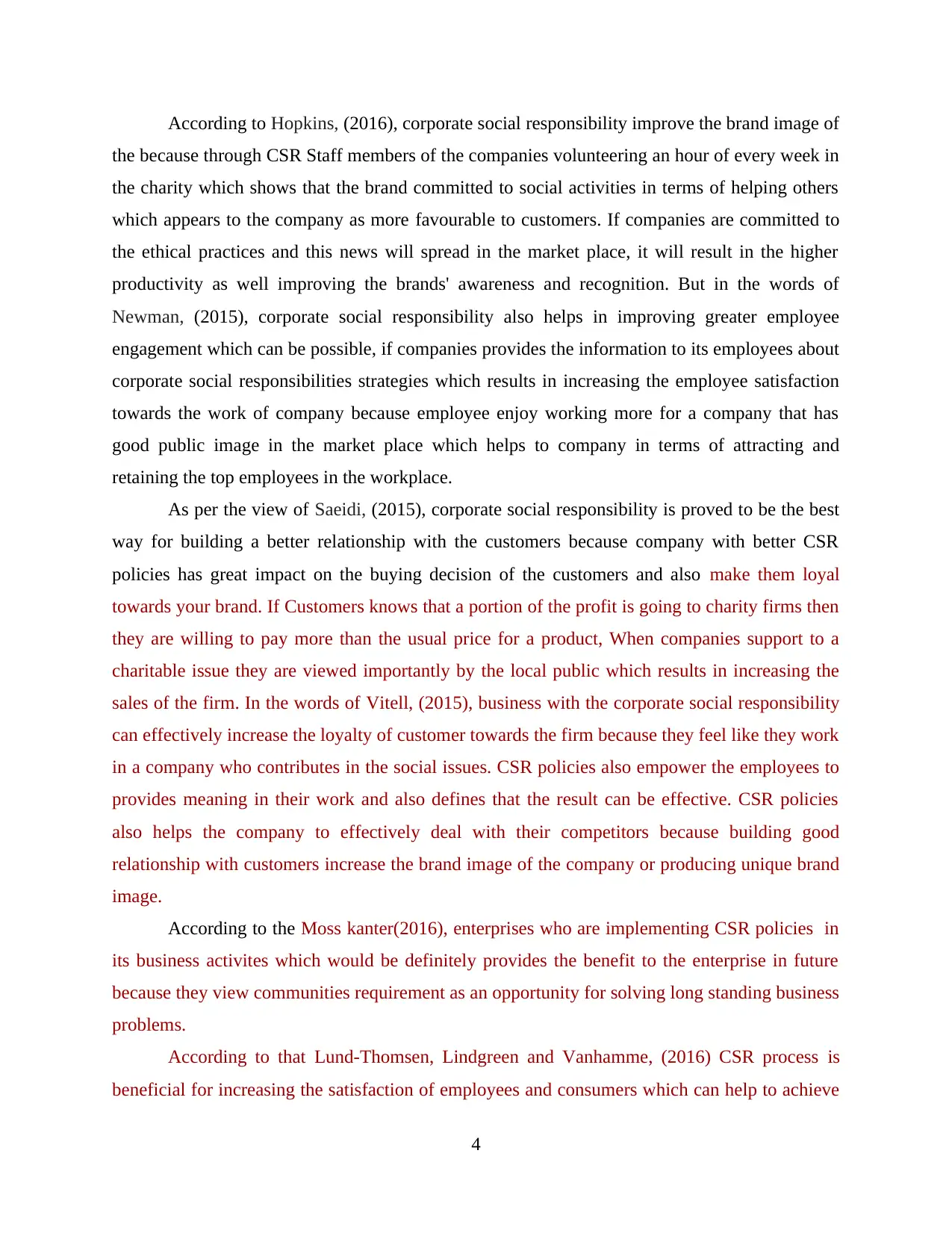
According to Hopkins, (2016), corporate social responsibility improve the brand image of
the because through CSR Staff members of the companies volunteering an hour of every week in
the charity which shows that the brand committed to social activities in terms of helping others
which appears to the company as more favourable to customers. If companies are committed to
the ethical practices and this news will spread in the market place, it will result in the higher
productivity as well improving the brands' awareness and recognition. But in the words of
Newman, (2015), corporate social responsibility also helps in improving greater employee
engagement which can be possible, if companies provides the information to its employees about
corporate social responsibilities strategies which results in increasing the employee satisfaction
towards the work of company because employee enjoy working more for a company that has
good public image in the market place which helps to company in terms of attracting and
retaining the top employees in the workplace.
As per the view of Saeidi, (2015), corporate social responsibility is proved to be the best
way for building a better relationship with the customers because company with better CSR
policies has great impact on the buying decision of the customers and also make them loyal
towards your brand. If Customers knows that a portion of the profit is going to charity firms then
they are willing to pay more than the usual price for a product, When companies support to a
charitable issue they are viewed importantly by the local public which results in increasing the
sales of the firm. In the words of Vitell, (2015), business with the corporate social responsibility
can effectively increase the loyalty of customer towards the firm because they feel like they work
in a company who contributes in the social issues. CSR policies also empower the employees to
provides meaning in their work and also defines that the result can be effective. CSR policies
also helps the company to effectively deal with their competitors because building good
relationship with customers increase the brand image of the company or producing unique brand
image.
According to the Moss kanter(2016), enterprises who are implementing CSR policies in
its business activites which would be definitely provides the benefit to the enterprise in future
because they view communities requirement as an opportunity for solving long standing business
problems.
According to that Lund-Thomsen, Lindgreen and Vanhamme, (2016) CSR process is
beneficial for increasing the satisfaction of employees and consumers which can help to achieve
4
the because through CSR Staff members of the companies volunteering an hour of every week in
the charity which shows that the brand committed to social activities in terms of helping others
which appears to the company as more favourable to customers. If companies are committed to
the ethical practices and this news will spread in the market place, it will result in the higher
productivity as well improving the brands' awareness and recognition. But in the words of
Newman, (2015), corporate social responsibility also helps in improving greater employee
engagement which can be possible, if companies provides the information to its employees about
corporate social responsibilities strategies which results in increasing the employee satisfaction
towards the work of company because employee enjoy working more for a company that has
good public image in the market place which helps to company in terms of attracting and
retaining the top employees in the workplace.
As per the view of Saeidi, (2015), corporate social responsibility is proved to be the best
way for building a better relationship with the customers because company with better CSR
policies has great impact on the buying decision of the customers and also make them loyal
towards your brand. If Customers knows that a portion of the profit is going to charity firms then
they are willing to pay more than the usual price for a product, When companies support to a
charitable issue they are viewed importantly by the local public which results in increasing the
sales of the firm. In the words of Vitell, (2015), business with the corporate social responsibility
can effectively increase the loyalty of customer towards the firm because they feel like they work
in a company who contributes in the social issues. CSR policies also empower the employees to
provides meaning in their work and also defines that the result can be effective. CSR policies
also helps the company to effectively deal with their competitors because building good
relationship with customers increase the brand image of the company or producing unique brand
image.
According to the Moss kanter(2016), enterprises who are implementing CSR policies in
its business activites which would be definitely provides the benefit to the enterprise in future
because they view communities requirement as an opportunity for solving long standing business
problems.
According to that Lund-Thomsen, Lindgreen and Vanhamme, (2016) CSR process is
beneficial for increasing the satisfaction of employees and consumers which can help to achieve
4
⊘ This is a preview!⊘
Do you want full access?
Subscribe today to unlock all pages.

Trusted by 1+ million students worldwide
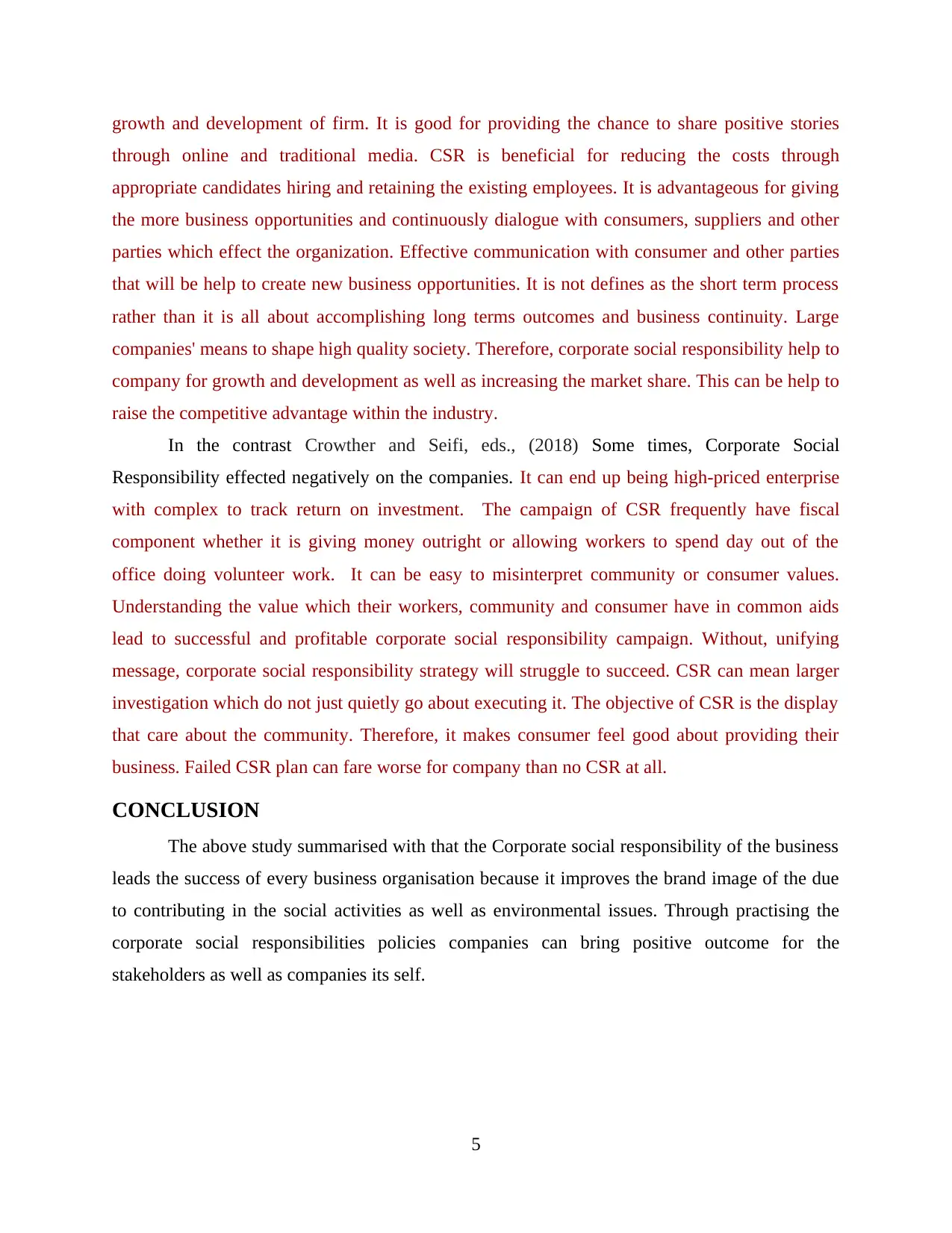
growth and development of firm. It is good for providing the chance to share positive stories
through online and traditional media. CSR is beneficial for reducing the costs through
appropriate candidates hiring and retaining the existing employees. It is advantageous for giving
the more business opportunities and continuously dialogue with consumers, suppliers and other
parties which effect the organization. Effective communication with consumer and other parties
that will be help to create new business opportunities. It is not defines as the short term process
rather than it is all about accomplishing long terms outcomes and business continuity. Large
companies' means to shape high quality society. Therefore, corporate social responsibility help to
company for growth and development as well as increasing the market share. This can be help to
raise the competitive advantage within the industry.
In the contrast Crowther and Seifi, eds., (2018) Some times, Corporate Social
Responsibility effected negatively on the companies. It can end up being high-priced enterprise
with complex to track return on investment. The campaign of CSR frequently have fiscal
component whether it is giving money outright or allowing workers to spend day out of the
office doing volunteer work. It can be easy to misinterpret community or consumer values.
Understanding the value which their workers, community and consumer have in common aids
lead to successful and profitable corporate social responsibility campaign. Without, unifying
message, corporate social responsibility strategy will struggle to succeed. CSR can mean larger
investigation which do not just quietly go about executing it. The objective of CSR is the display
that care about the community. Therefore, it makes consumer feel good about providing their
business. Failed CSR plan can fare worse for company than no CSR at all.
CONCLUSION
The above study summarised with that the Corporate social responsibility of the business
leads the success of every business organisation because it improves the brand image of the due
to contributing in the social activities as well as environmental issues. Through practising the
corporate social responsibilities policies companies can bring positive outcome for the
stakeholders as well as companies its self.
5
through online and traditional media. CSR is beneficial for reducing the costs through
appropriate candidates hiring and retaining the existing employees. It is advantageous for giving
the more business opportunities and continuously dialogue with consumers, suppliers and other
parties which effect the organization. Effective communication with consumer and other parties
that will be help to create new business opportunities. It is not defines as the short term process
rather than it is all about accomplishing long terms outcomes and business continuity. Large
companies' means to shape high quality society. Therefore, corporate social responsibility help to
company for growth and development as well as increasing the market share. This can be help to
raise the competitive advantage within the industry.
In the contrast Crowther and Seifi, eds., (2018) Some times, Corporate Social
Responsibility effected negatively on the companies. It can end up being high-priced enterprise
with complex to track return on investment. The campaign of CSR frequently have fiscal
component whether it is giving money outright or allowing workers to spend day out of the
office doing volunteer work. It can be easy to misinterpret community or consumer values.
Understanding the value which their workers, community and consumer have in common aids
lead to successful and profitable corporate social responsibility campaign. Without, unifying
message, corporate social responsibility strategy will struggle to succeed. CSR can mean larger
investigation which do not just quietly go about executing it. The objective of CSR is the display
that care about the community. Therefore, it makes consumer feel good about providing their
business. Failed CSR plan can fare worse for company than no CSR at all.
CONCLUSION
The above study summarised with that the Corporate social responsibility of the business
leads the success of every business organisation because it improves the brand image of the due
to contributing in the social activities as well as environmental issues. Through practising the
corporate social responsibilities policies companies can bring positive outcome for the
stakeholders as well as companies its self.
5
Paraphrase This Document
Need a fresh take? Get an instant paraphrase of this document with our AI Paraphraser
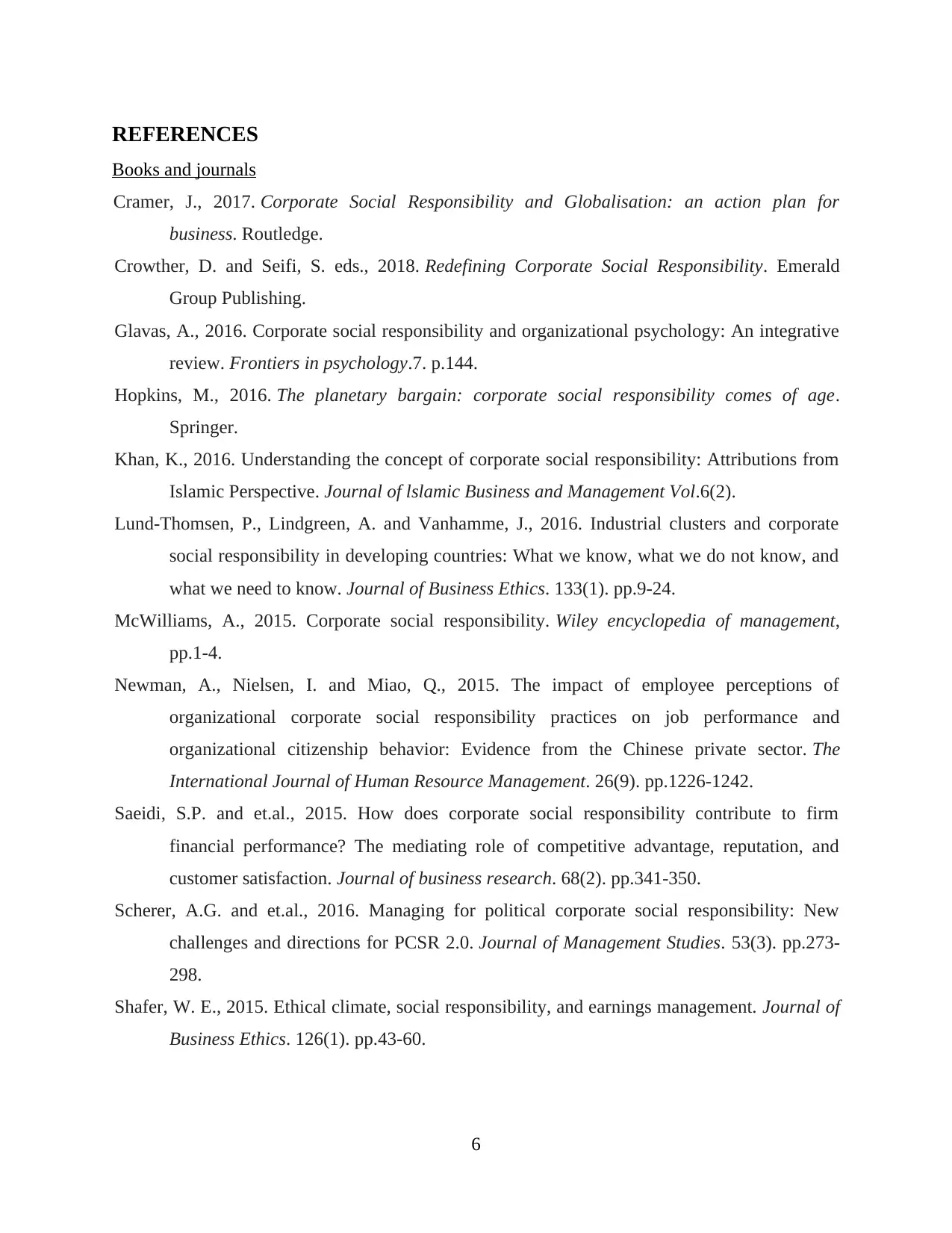
REFERENCES
Books and journals
Cramer, J., 2017. Corporate Social Responsibility and Globalisation: an action plan for
business. Routledge.
Crowther, D. and Seifi, S. eds., 2018. Redefining Corporate Social Responsibility. Emerald
Group Publishing.
Glavas, A., 2016. Corporate social responsibility and organizational psychology: An integrative
review. Frontiers in psychology.7. p.144.
Hopkins, M., 2016. The planetary bargain: corporate social responsibility comes of age.
Springer.
Khan, K., 2016. Understanding the concept of corporate social responsibility: Attributions from
Islamic Perspective. Journal of lslamic Business and Management Vol.6(2).
Lund-Thomsen, P., Lindgreen, A. and Vanhamme, J., 2016. Industrial clusters and corporate
social responsibility in developing countries: What we know, what we do not know, and
what we need to know. Journal of Business Ethics. 133(1). pp.9-24.
McWilliams, A., 2015. Corporate social responsibility. Wiley encyclopedia of management,
pp.1-4.
Newman, A., Nielsen, I. and Miao, Q., 2015. The impact of employee perceptions of
organizational corporate social responsibility practices on job performance and
organizational citizenship behavior: Evidence from the Chinese private sector. The
International Journal of Human Resource Management. 26(9). pp.1226-1242.
Saeidi, S.P. and et.al., 2015. How does corporate social responsibility contribute to firm
financial performance? The mediating role of competitive advantage, reputation, and
customer satisfaction. Journal of business research. 68(2). pp.341-350.
Scherer, A.G. and et.al., 2016. Managing for political corporate social responsibility: New
challenges and directions for PCSR 2.0. Journal of Management Studies. 53(3). pp.273-
298.
Shafer, W. E., 2015. Ethical climate, social responsibility, and earnings management. Journal of
Business Ethics. 126(1). pp.43-60.
6
Books and journals
Cramer, J., 2017. Corporate Social Responsibility and Globalisation: an action plan for
business. Routledge.
Crowther, D. and Seifi, S. eds., 2018. Redefining Corporate Social Responsibility. Emerald
Group Publishing.
Glavas, A., 2016. Corporate social responsibility and organizational psychology: An integrative
review. Frontiers in psychology.7. p.144.
Hopkins, M., 2016. The planetary bargain: corporate social responsibility comes of age.
Springer.
Khan, K., 2016. Understanding the concept of corporate social responsibility: Attributions from
Islamic Perspective. Journal of lslamic Business and Management Vol.6(2).
Lund-Thomsen, P., Lindgreen, A. and Vanhamme, J., 2016. Industrial clusters and corporate
social responsibility in developing countries: What we know, what we do not know, and
what we need to know. Journal of Business Ethics. 133(1). pp.9-24.
McWilliams, A., 2015. Corporate social responsibility. Wiley encyclopedia of management,
pp.1-4.
Newman, A., Nielsen, I. and Miao, Q., 2015. The impact of employee perceptions of
organizational corporate social responsibility practices on job performance and
organizational citizenship behavior: Evidence from the Chinese private sector. The
International Journal of Human Resource Management. 26(9). pp.1226-1242.
Saeidi, S.P. and et.al., 2015. How does corporate social responsibility contribute to firm
financial performance? The mediating role of competitive advantage, reputation, and
customer satisfaction. Journal of business research. 68(2). pp.341-350.
Scherer, A.G. and et.al., 2016. Managing for political corporate social responsibility: New
challenges and directions for PCSR 2.0. Journal of Management Studies. 53(3). pp.273-
298.
Shafer, W. E., 2015. Ethical climate, social responsibility, and earnings management. Journal of
Business Ethics. 126(1). pp.43-60.
6
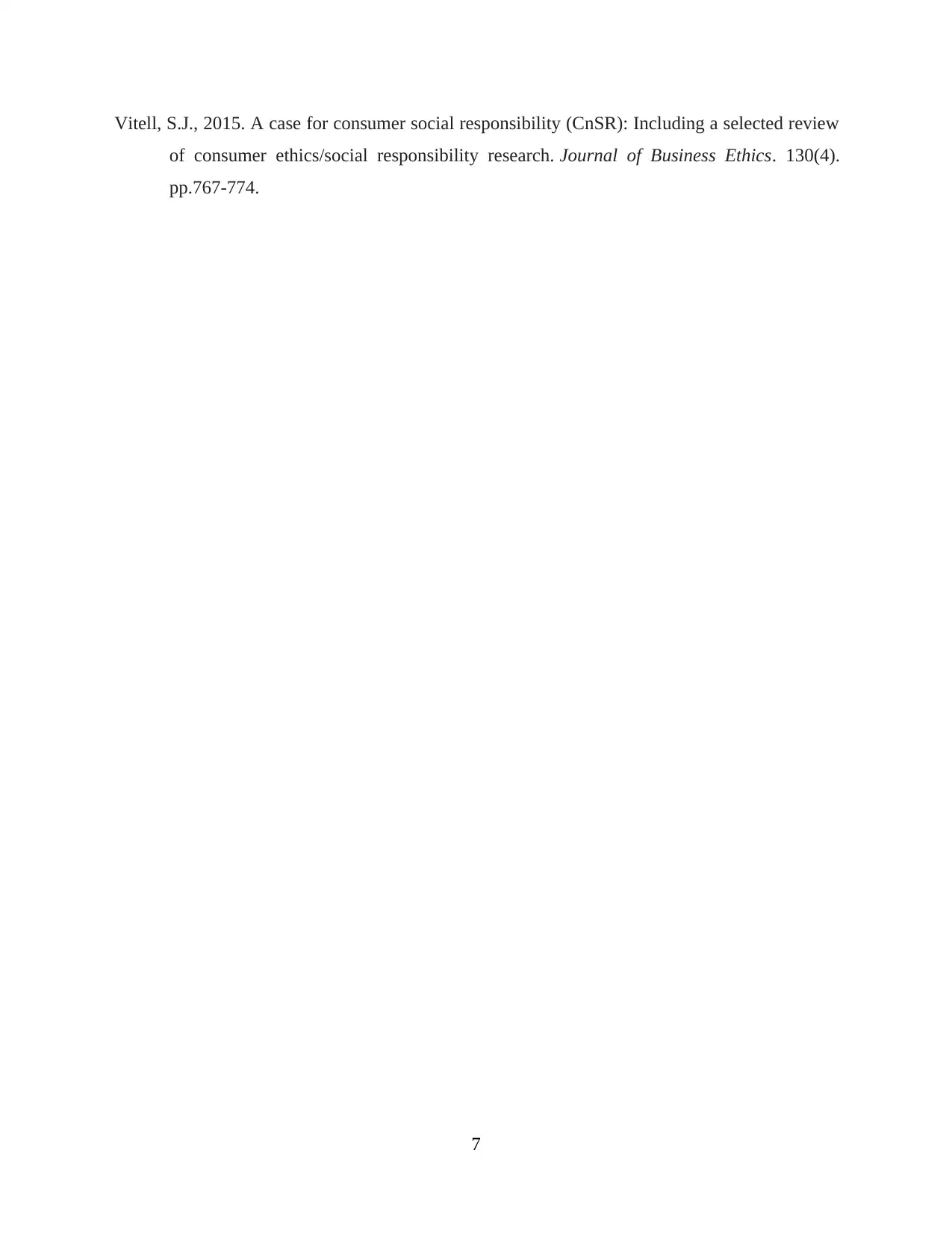
Vitell, S.J., 2015. A case for consumer social responsibility (CnSR): Including a selected review
of consumer ethics/social responsibility research. Journal of Business Ethics. 130(4).
pp.767-774.
7
of consumer ethics/social responsibility research. Journal of Business Ethics. 130(4).
pp.767-774.
7
⊘ This is a preview!⊘
Do you want full access?
Subscribe today to unlock all pages.

Trusted by 1+ million students worldwide
1 out of 9
Related Documents
Your All-in-One AI-Powered Toolkit for Academic Success.
+13062052269
info@desklib.com
Available 24*7 on WhatsApp / Email
![[object Object]](/_next/static/media/star-bottom.7253800d.svg)
Unlock your academic potential
Copyright © 2020–2026 A2Z Services. All Rights Reserved. Developed and managed by ZUCOL.





